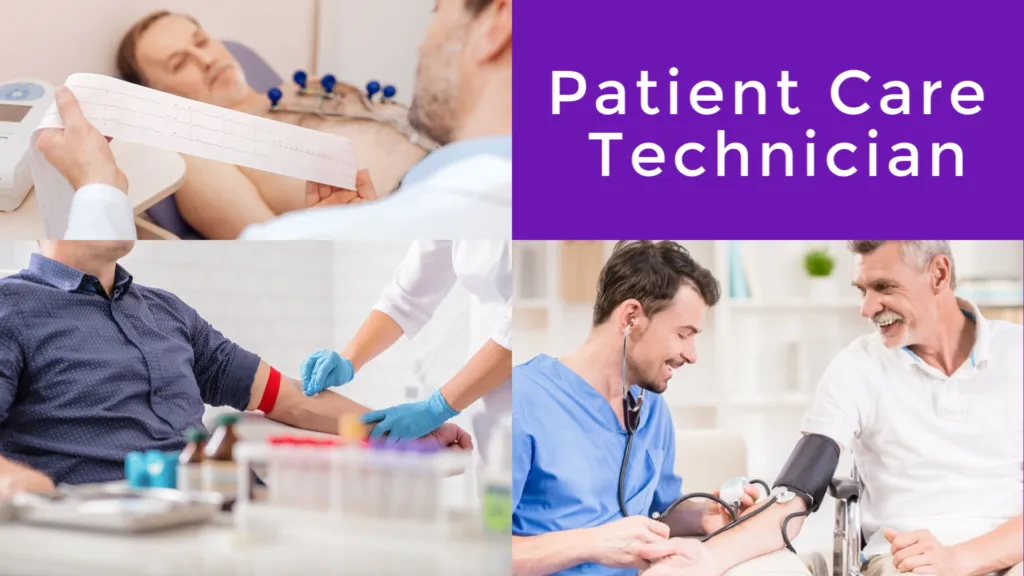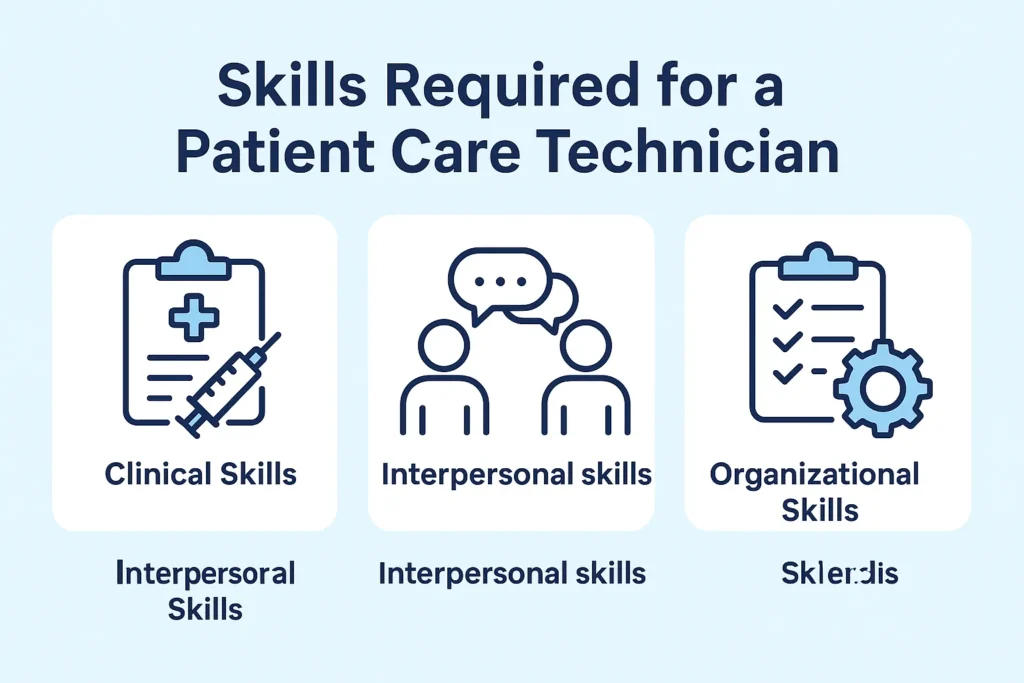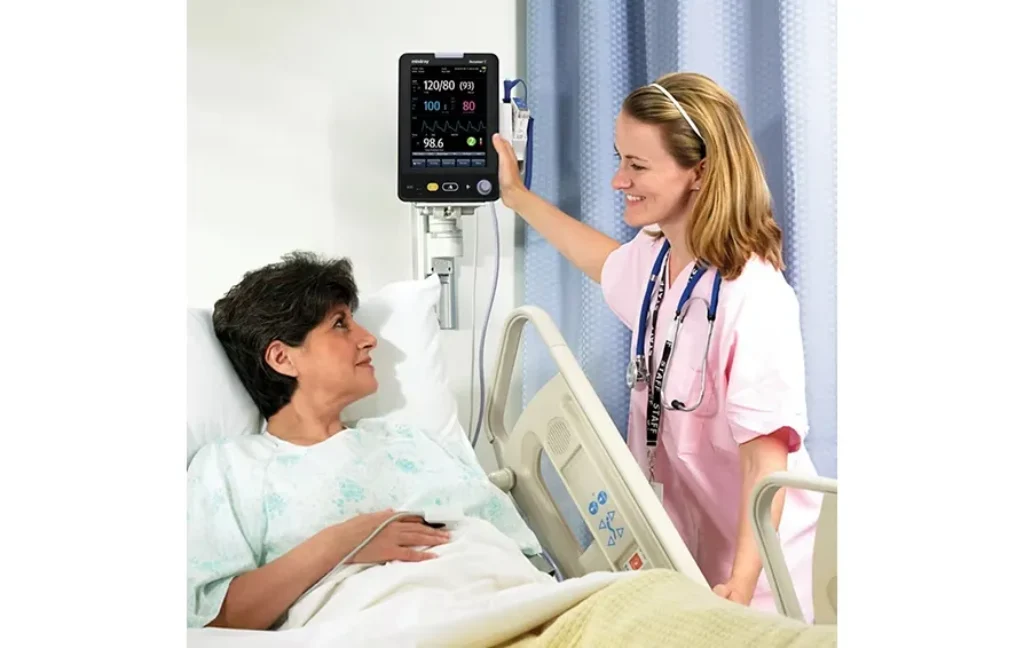
Executive Summary
A Patient Care Technician (PCT) is a healthcare professional who provides direct care to patients under the supervision of registered nurses (RNs) and physicians. PCTs play a critical role in maintaining the comfort, safety, and well-being of patients in hospitals, nursing homes, and other medical facilities.
The role combines clinical skills, compassionate care, and administrative duties. Patient Care Technicians are responsible for assisting with daily living activities, monitoring vital signs, performing basic medical procedures, and ensuring the patient environment is safe and clean. This guide explores the role, responsibilities, education, skills, career paths, and benefits of becoming a patient care technician.
Table of Content
1. Understanding the Role of a Patient Care Technician
1.1 Definition
A Patient Care Technician is a healthcare worker trained to provide basic clinical care and support to patients. PCTs assist medical staff with monitoring patient health, performing routine medical tasks, and ensuring patients receive personal care and attention.
1.2 Importance in Healthcare
PCTs are essential for delivering high-quality patient care because they:
- Provide direct support to patients for daily activities
- Assist nurses and doctors with clinical procedures
- Monitor and report patient conditions
- Maintain patient safety and comfort
- Reduce the workload of nurses and other medical staff
1.3 Work Environments
Patient Care Technicians work in a variety of healthcare settings:
- Hospitals
- Outpatient clinics
- Nursing homes and assisted living facilities
- Rehabilitation centers
- Home healthcare
2. Key Responsibilities of a Patient Care Technician
The responsibilities of a PCT can be categorized into clinical duties, patient support, and administrative tasks.
2.1 Clinical Duties
- Monitoring vital signs: Blood pressure, heart rate, temperature, respiratory rate
- Assisting with medical procedures: Phlebotomy (drawing blood), EKGs, catheterization
- Basic wound care: Cleaning and dressing minor wounds under supervision
- Collecting specimens: Urine, stool, or other lab samples for testing
2.2 Patient Support
- Assisting with personal hygiene: Bathing, dressing, oral care
- Helping patients with mobility: Transferring, walking, and using mobility aids
- Ensuring patient comfort and safety: Adjusting beds, providing blankets or pillows
- Responding to patient needs and requests promptly
2.3 Administrative Tasks
- Maintaining accurate patient records
- Communicating observations to nurses and physicians
- Assisting with inventory of medical supplies
- Scheduling patient appointments and follow-ups in some settings
3. Education and Training Requirements
3.1 High School Diploma or Equivalent
A minimum of a high school diploma or GED is required to enter the field. Courses in biology, chemistry, and health sciences can provide a strong foundation.
3.2 Post-Secondary Training Programs
Many PCTs complete a formal training program, often lasting 4–12 months, which includes:
- Anatomy and physiology
- Medical terminology
- Infection control and safety procedures
- Basic patient care skills
- Clinical practice and hands-on training
3.3 Certification
Certification is highly recommended and sometimes required, depending on the state and employer. Popular certifications include:
- Certified Patient Care Technician/Assistant (CPCT/A)
- Nursing Assistant Certification (CNA) – often a prerequisite for PCT roles
- Phlebotomy Certification – for drawing blood and lab work
- EKG Technician Certification – for cardiac monitoring
Certification programs usually require completion of coursework, clinical hours, and passing an exam.
Recommended Courses to Strengthen Your Healthcare Career
If you’re working as, or preparing to become, a patient care technician and want to expand your expertise, these courses offer valuable skills in healthcare, IT, business and safety:
- AI in Healthcare Specialization — Learn how AI is transforming patient care, diagnostics and hospital workflows.
- Healthcare IT Support Specialization — Build IT skills that support electronic health records, patient data systems and the tech infrastructure in healthcare settings.
- The Business of Health Care Specialization — Gain insight into how healthcare organisations operate, budgets, compliance and business strategy.
- Patient Safety Specialization Course — Dive into essential protocols, safety standards and risk management to support high‑quality patient care.
4. Skills Required for a Patient Care Technician
A successful PCT combines technical, interpersonal, and organizational skills.

4.1 Clinical Skills
- Taking vital signs accurately
- Performing EKGs and phlebotomy
- Administering basic medical procedures under supervision
- Understanding infection control and patient safety protocols
4.2 Interpersonal Skills
- Compassion and empathy for patients
- Effective communication with patients and healthcare teams
- Patience and adaptability in challenging situations
- Teamwork and collaboration
4.3 Organizational Skills
- Maintaining accurate records and documentation
- Time management and prioritizing patient needs
- Attention to detail for monitoring patient conditions
- Ability to follow protocols and healthcare regulations
5. Daily Responsibilities and Workflow
A typical day for a Patient Care Technician involves structured routines and flexibility to respond to patient needs.
5.1 Morning Rounds
- Check patient vitals and update records
- Assist patients with morning hygiene and breakfast
- Prepare for scheduled medical procedures
5.2 Midday Duties
- Monitor patient conditions and alert nurses to changes
- Collect lab specimens and assist in diagnostic tests
- Administer medications under supervision if allowed
5.3 Evening and Night Duties
- Help patients with dinner and mobility
- Document patient observations for the next shift
- Ensure patient rooms are clean and safe
- Respond to emergencies and patient calls
6. Work Environment and Conditions
6.1 Physical Demands
- Long periods of standing and walking
- Lifting or assisting patients with mobility
- Repetitive tasks such as taking vitals or drawing blood
6.2 Work Schedule
- Full-time, part-time, and per diem positions
- Rotating shifts including nights, weekends, and holidays
- Flexibility required to respond to patient needs and emergencies
6.3 Stress and Challenges
- Emotional stress from patient illness or end-of-life care
- Exposure to infectious diseases
- High-pressure situations requiring quick decision-making
7. Career Path and Advancement

7.1 Entry-Level Roles
- Patient Care Technician / Assistant – providing direct patient care
- Nursing Assistant – similar role in hospitals and long-term care facilities
7.2 Mid-Level Opportunities
- Specialize in areas such as phlebotomy, EKG, or IV therapy
- Move into supervisory or lead technician roles
- Work in specialized units like ICU, emergency, or dialysis centers
7.3 Long-Term Career Growth
- Transition to Registered Nurse (RN) or Licensed Practical Nurse (LPN) roles
- Pursue healthcare administration or clinical education
- Certification in specialized fields can lead to higher pay and responsibilities
8. Salary and Job Outlook
8.1 Salary
- Entry-level PCTs: $28,000–$35,000 per year
- Experienced PCTs: $35,000–$45,000 per year
- Specialized or supervisory roles: $45,000–$55,000+ per year
8.2 Job Outlook
- The Bureau of Labor Statistics (BLS) projects steady demand for healthcare support roles due to:
- Aging population requiring long-term care
- Increased patient needs in hospitals and clinics
- Expansion of outpatient services and home healthcare
9. Benefits of Being a Patient Care Technician
- Direct impact on patient lives through compassionate care
- Opportunities for growth into nursing or specialized healthcare roles
- Exposure to a variety of clinical experiences
- Develop strong communication, technical, and healthcare skills
- Potential for flexible schedules and diverse work settings
10. Challenges Faced by Patient Care Technicians
- Physical and emotional demands of patient care
- Long shifts and irregular hours
- Exposure to illness and hazardous materials
- Need for constant vigilance and attention to detail
- High-pressure situations requiring rapid response
Tips for Coping:
- Practice self-care and stress management
- Build strong communication with healthcare team
- Seek mentorship and ongoing training
- Use proper body mechanics and safety protocols
11. Tools and Equipment Used
PCTs work with a variety of tools and medical equipment, including:

- Vital signs monitors: Blood pressure cuffs, thermometers, pulse oximeters
- EKG machines: For cardiac monitoring
- Phlebotomy kits: Needles, vacutainers, and collection tubes
- Patient mobility aids: Wheelchairs, walkers, and lifts
- Hygiene and care supplies: Gloves, gowns, cleaning equipment, and bathing supplies
- Electronic Health Records (EHR) systems: Documenting patient care
12. Certification and Continuing Education
12.1 Why Certification Matters
- Demonstrates competence and professionalism
- Often required by employers or state regulations
- Enhances career advancement opportunities
12.2 Continuing Education
- Stay updated on new clinical procedures
- Attend workshops and seminars
- Pursue additional certifications (IV therapy, phlebotomy, EKG)
- Learn healthcare technology systems and updates
13. Tips for Aspiring Patient Care Technicians
- Gain hands-on experience: Volunteer in hospitals or clinics
- Develop strong communication skills: Essential for interacting with patients and healthcare teams
- Focus on empathy and compassion: Core to patient-centered care
- Stay organized: Track patient records and schedules efficiently
- Pursue certifications early: Enhances employability and credibility
14. Conclusion
A Patient Care Technician is a vital part of the healthcare system, combining technical expertise, compassionate care, and administrative responsibilities to support patient well-being. The role offers career stability, personal fulfillment, and opportunities for growth into nursing or specialized healthcare positions.
Aspiring PCTs should focus on formal training, hands-on experience, certification, and skill development to excel in this rewarding profession. With dedication, empathy, and continuous learning, a career as a Patient Care Technician can be both fulfilling and impactful, providing meaningful contributions to patients and the healthcare community.


